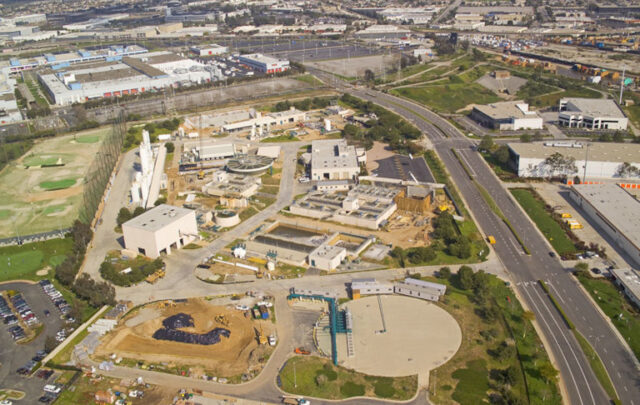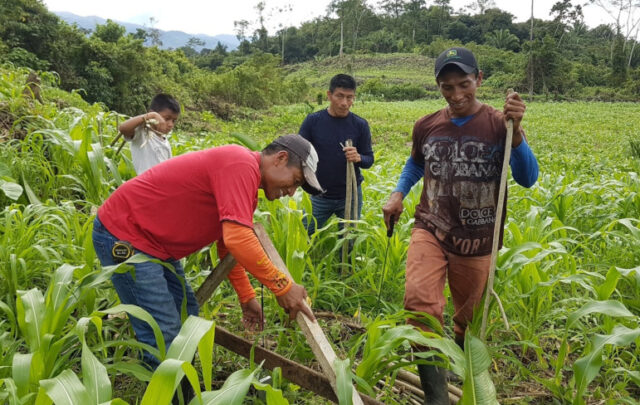
Nature’s chaotic abundance takes root in an abandoned flower pot.
Wabi-sabi is a Japanese term that does not translate well to English, but using a thousand words, perhaps we shall begin to understand. Wabi originally referred to the loneliness of living in nature, but now reflects a meaning more of rustic simplicity, freshness, or quietness. Wabi also refers to the quirks and imperfections that arise during the creation process. Sabi refers to the beauty which comes into being as something ages. According to wikipedia, “if an object or expression can bring about, within us, a sense of serene melancholy and a spiritual longing, then that object could be said to be wabi-sabi.” Also, wabi-sabi “nurtures all that is authentic by acknowledging three simple realities: nothing lasts, nothing is finished, and nothing is perfect.”
Wabi-sabi can also be translated to mean “perfect poorness”, when something is so vibrantly je ne sais quoi–—when it invokes that exquisite feeling of such suchness—that is the power of wabi-sabi welling up within us. This feeling requires no effort on our behalf, nor on the behalf of the object or situation beheld. It is a feeling of immensity that exudes, like the mysterious power of flowing water, the caress of a gentle breeze, or empty space. It is natural and spontaneous, and often can produce “satori”, a zen kick to the head, akin to a sudden awakening or enlightenment.
When my eyes were opened to the splendor of wabi-sabi, a whole new reality snapped into focus. For want of a word, I could not see its special reality. It makes me wonder, how many words have I not been taught? How many realities are to be revealed? The more layers that are stripped, the more layers appear. Will I ever reach the core of my own apple? (A few bits of harmless cyanide, encased in sweet flesh…) Of course, unveiling those realities are the seeds of many other caffeine-derived maniacal essays, to be expounded upon later.
Now that we’ve gotten our Japanese terms somewhat defined, though they will forever reside in the vacuum of culturally-deprived ill translation, we can explore what wabi-sabi means to us. I live in what is politely referred to as the inner city, acknowledged to be a blighted area, and what is informally known as a ghetto. The term ghetto can be offensively taken as a derogatory term by the dominant culture that created this reality, neutrally understood in terms of the definition of an enforced separate place to live (in this case enforced by socio-economic conditions, as well as ethnicity), or it can be embraced as the words queer and nigger have been, completely diffusing the dominating power of words. I live in a ghetto. If you’re from a real ghetto, my neighborhood probably seems like a nice quaint place to live. But if you’re white and middle class and from Springfield, you’ll be sure to lock your car doors while commuting to and from work, and be nervous when stopped at a red light and a black man crosses the street in front of you.
The infrastructure in my neighborhood has not seen “improvement” for decades, and in fact, nature has reclaimed most of the sidewalks, and the potholes will soon be deep enough for trees to take root. Many small run-down houses are falling in because the housing market is so depressed no one will buy them, not even for a few thousand dollars, despite the deep fertile topsoil that naturally occurs in this area. Rental rates have skyrocketed to nearly 50%, far above what is considered the risk rate for “transitory” dilapidated neighborhoods. More houses on my block are empty than are lived in. I could go on about the school that produces students who are functionally illiterate and hate learning, the police that are quite good at harassment but are never around when their brute force would be appreciated, the deaf ears of city government who happily take tax money from us but do not return it in basic city services, but you get the idea, I’m sure.
I live in this ghetto, and I see the beauty that surrounds me. It is wabi-sabi in its essential and ethereal state. I see people who flourish in the economy of community while the economy of the imaginary dollar and bipolar stock market attempts to keep them firmly in the purgatory of poverty. I see verdant empty lots, full of hardy pioneering weeds, fixing the soil and adding nutrients and humus, allowing trees to take root to reforest the ghetto, and healing herbs sprouting beneath our feet. I see children playing in the streets, disregarding the hierarchy of vehicular traffic. I witness practically everyone biking and walking, using their own fuel instead of supporting blatant slaughter of those who happen to live above “our” oil fields. There is a remnant of an American elm forest, those that survived the blight and also a recent tornado. It shelters us from simmering August heat, as well as soaks in the massive downpours of climate change. Life abounds, not only human, but also many forest animals you would not think could make it in a ghetto: rabbits, foxes, raccoons, possums, owls, and deer.
Mostly, though, it is the people here who embody wabi-sabi to their cores: the old withered women who ride the bus to work, as they have for 50 years previously; the redneck who hunts deer and shares with all his neighbors; the overworked single mom who ran from her home to help a stranger shot in the street, put his leg in a tourniquet and comforted him, telling him, “hang on baby, you gonna be okay” over and over, while waiting endlessly for an ambulance. There are the grans who are faithful to the farmers market, getting good greens to cook up for their grandkids; the manly men who put their arms around teenaged boys who cry because their friends and relatives get shot. It is the homes that were built, one stray piece of lumber at a time, and the yards that cannot possibly be called lawns, sprouting highly valued odd things, junk for all purposes and manners of being. It is the conversations on the bus, a rolling coffeehouse sans coffee, catching up on all manners of gossip and good times, harkening encouragement or chastisement to those who need it.
There are young people who also see the inherent wabi-sabi of this ghetto neighborhood. They are not interested in pursuing the unattainable American dream; they are uninterested in working, consuming, and dying for the sake of America, Inc. They see paradise sprouting up between the cracks in the pavement, the alleys overtaken by passion fruit and elderberries and lambs quarters. They see down to earth people who remember how to care. They seek an affordable life, free from the toil required by Leviathan, empowered by the care and creation of ideas that make sense and their hands aching to enact them. They see not a place of despair and poverty, but a place of richness and beauty in community. Gardens sprouting up in front lawns are only the beginning.
Wabi-sabi resides in the relationships of the people who live here. It is perfect poorness, something acquired with age and beauty, something that does not occur in plywood and vinyl subdivisions, no matter how shiny and well advertised. Wabi-sabi is indicative of the small pleasures of life, those that require no money, just an eye for beauty. When your eye is focused not on the toxic mental and physical environment of America, Inc.—not mired in the media bog that requires you to internalize this toxicity—but with an eye focused on the wonder of wabi-sabi, a whole new reality snaps into being. There is abundance, fecundity, beauty, purity, a richness beyond compare, a suchness that can barely be put into words. Wabi-sabi is my life, my manifesto. Wabi-sabi surrounds me, pervades from the inside out. It is as close to perfection and imperfection as I ever hope to be.





